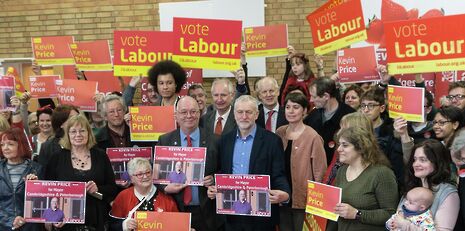

Surprise election. Predictable result
Left-wing Cambridge students will have to vote at home – or go home, writes Labour supporter Sam Willis

As the ‘politics guy’ around the Violet cyber office, I’ve been asked to produce a ‘hot take’ on the snap general election. Here’s my ‘hot take’: the Conservatives will win. The end.
Never have I felt so dispirited at the onset of a political campaign. No one, it seems, except the hardcore of Corbynistas are kidding themselves over this: it’s only a question of the margin by which Theresa May wins. I keep telling myself it could never be as bad as 1931, when Labour dropped from 287 to 52 seats. I keep telling myself this. But then again...
Theresa May has masterfully played this. In fact, masterfully is an understatement at this stage. What did she do? She argued that she only decided to call the election with great reluctance, only after it had become ‘apparent’ that those pesky Labour and Liberal Democrat MPs would try to obstruct Brexit (she tells us). She argued that only she could provide the necessary leadership for the (undoubtedly) rocky years that lie ahead. She argued that she needed a strong majority to secure the best deal possible.
"Kudos to May I suppose. A gamble for sure, but she would have been foolish not to take this gamble, and she’s played the cards dealt to her as best she could"
By pitching the election in this way, she has shifted attention away from the NHS and Education, where she is weak, and onto ‘the national interest’ in strong leadership, where she is undoubtedly stronger than the next guy. Since much of the electorate is still suspicious of Labour and the Liberal Democrats when they say they want Brexit to work, this strategy ingeniously reaches out to the many Remain voters out there who accepted the result and now just want a good deal. She has made the inevitability of Brexit an assumption of the election in the same way Cameron made the importance of the deficit an assumption in the 2010 and 2015 elections. The Conservatives now control the narrative. And so they will win.
Kudos to May I suppose. A gamble for sure, but she would have been foolish not to take this gamble, and she’s played the cards dealt to her as best she could. Tim Farron should also be praised for his energetic response – he’s already due to head down to the south-west, a key Lib Dem battleground where they could win seats. I feel like I should be more disappointed and sad than I am about the chaos and lethargy with which Labour central office have responded. And, unlike Owen Jones (watch a recent interview between him and Alastair Campbell), I am not scared to say as such for fear of ‘damaging the left’. Corbyn has already done that. Now it’s damage control.
And on that note, I sincerely do wish the best to all those hardworking and principled Labour MPs who now face humiliation because of Corbyn. I’m thinking of Wes Streeting (Ilford North) who has a majority of less than 600. I feel sorry for Rupa Huq (Ealing Central and Action) with a majority of less than 300. I genuinely worry for the likes of Bridget Phillipson (Houghton and Sunderland South), who has a huge majority but may see it melt away as natural Labour voters show their dissatisfaction at the ballot box.
Maybe I’m wrong. I hope I’m wrong. I’d rather not live in a de facto one-party state pursuing hard Brexit. If May gets the huge majority she’s expected, she’ll be beholden to no one but the Tory hard-right and the likes of the Mail/Telegraph cabal. How can we minimise the likelihood of this happening? Follow these simple steps:
1. If your home constituency is marginal, vote there (apply for a postal vote now). Cambridge is Labour/Liberal Democrat marginal: your vote is better spent elsewhere.
2. If you don’t know whether your home seat is marginal, look it up on Wikipedia. It takes 30 seconds.
3. Vote for the biggest party that isn’t the Conservatives. So for example, in Ilford North you would vote Labour; in Yeovil you would vote Liberal Democrat. Again, look this up on Wikipedia.
4. Get everyone else you know who doesn’t want a hard Brexit to do the same.
5. Actually register to vote and actually vote.
As students we have the golden opportunity to deploy our vote where it is most needed. So please do.
This, I’m sure, won’t be the last you hear from me on this

